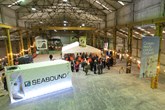SDARI undertake development of new bulk carrier
Published by Oliver Kleinschmidt,
Deputy Editor
Dry Bulk,
Lloyd’s Register (LR) and SDARI have revealed they are jointly developing the third generation of SDARI’s 64 500 DWT ‘Dolphin’ bulk carrier, which has been key product designs from SDARI for the past decade.
The design, which focuses on maximising deadweight, capacity and fuel energy efficiency, will feature novel hull lines and Fan Duct & Fan Cap to support with energy-saving devices.
SDARI has reconfigured the arrangement for lightship weight to increase the deadweight and the structure and hull form are optimised for better ship performance, lower fuel consumption and to achieve the Energy Efficiency Design Index (EEDI) phase III.
Nikos Kakalis, Global Bulk Carrier Segment Director LR said: “This project underscores the continued evolution of Ultramax bulk carrier design and the technical strength and capability of SDARI, one of China’s leading ship designers and a long-standing partner of LR. This design, which has attained an EEDI reduction of 40%, will help bulk carrier owners to better control their emissions, while owning and operating a highly competitive asset in the market.”
Li Xin, Vice-Director of SDARI, said: “Comparing with the last generation of 'Dolphin' ultramax, the deadweight is 1000 t more, and fuel oil consumption is around 20 tpd. This generation can have a deadweight up to 66 000 t and various alternative fuels solutions are ready. This means this new design will help ship owners to reduce their carbon emission and improve sustainability.”
Click here for free registration to Dry Bulk
Read the article online at: https://www.drybulkmagazine.com/dry-bulk/07062024/sdari-undertake-development-of-new-bulk-carrier/
You might also like
Seabound receives ESA award and completes first full-scale carbon capture units
Seabound celebrates completion of first full-scale maritime carbon capture units and €1.5 million European Space Agency award at event in Doncaster.

